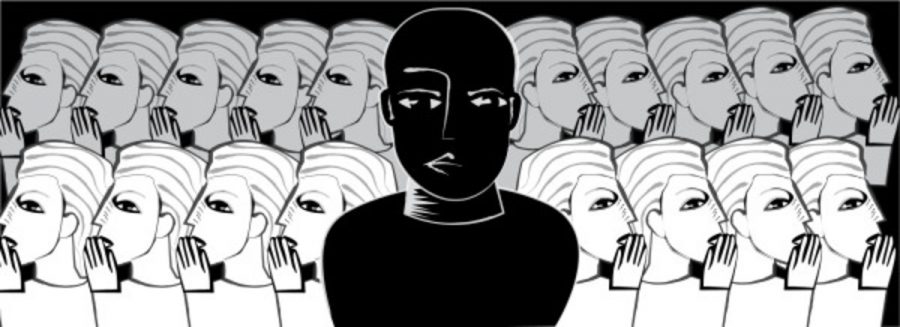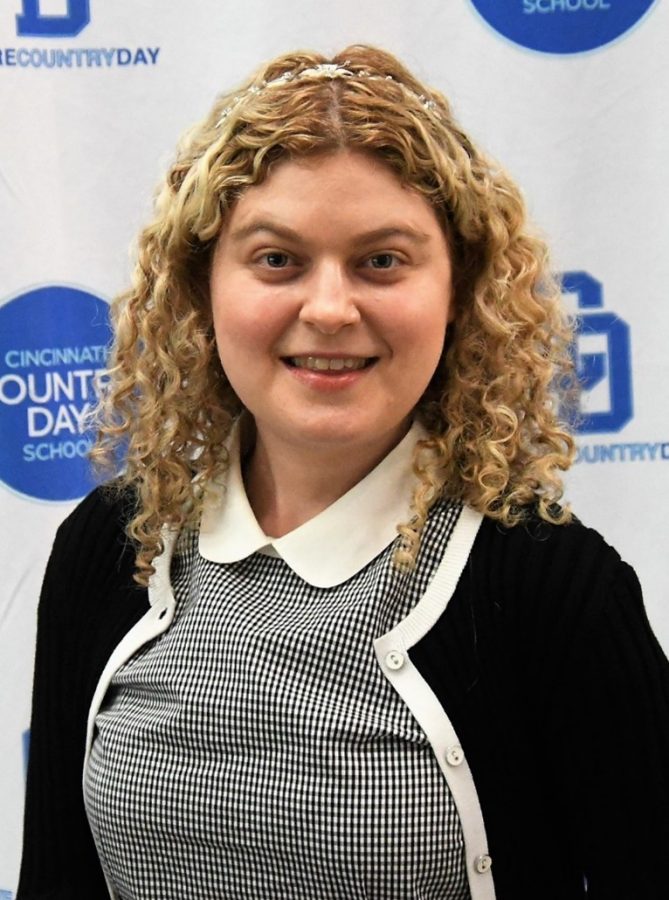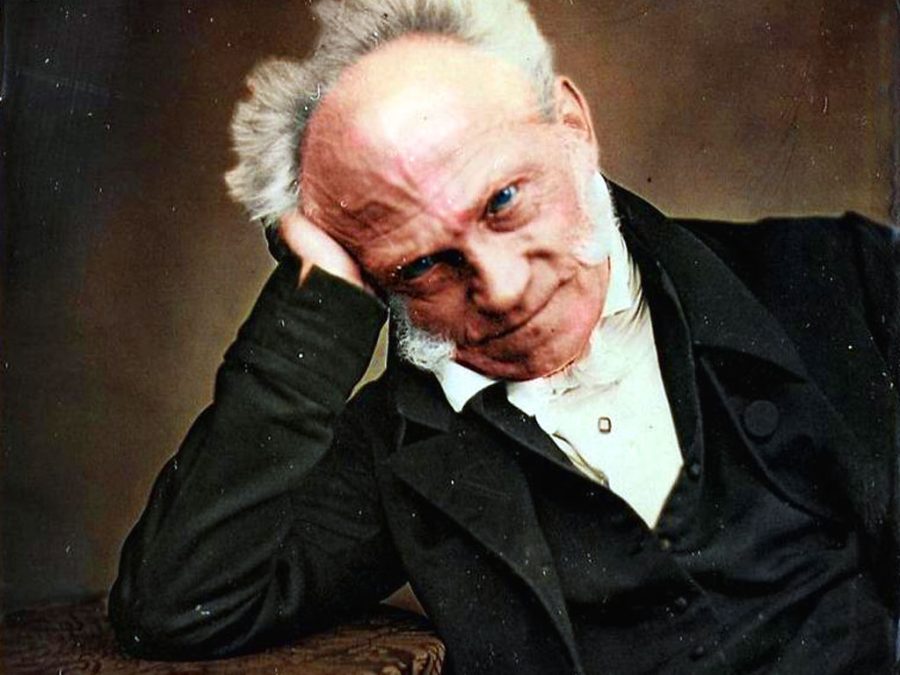By Jordann Sadler ’18, Perspective Editor
Disclaimer: This article is about a very controversial topic, please respect all opinions expressed in this article. The article is censored and will refer to the N-Word only as the N-Word. Any profanity is censored.
Contributing to the ongoing race war in America is a word that has been used to slander African Americans and people of black descent. Since slavery, the hostility of the “N-word” is universally understood and is considered as a taboo word for many races. Yet, the word can be heard commonly in rap music, in most black stand-up comedy, and is also repeated in the African-American community. The issue surfaced this year in the Country Day community when the 8th grade replaced To Kill a Mockingbird with The Old Man and The Sea in February, while all juniors continued to read The Tales of Huckleberry Finn. While interviewing around school, I found that many people did not want to talk about the N-Word or wanted to remain anonymous if they chose to address the topic in an interview. Addressing discrimination is very uncomfortable, especially when mentioning black and white relations. The differences between these two specific ethnicities in America can cause awkward situations in places where conversations of race are needed the most. What is wrong with discussing race? Thanks to my thirteen brave participants, I was able to, at least, touch the surface of the evolution and animosity around the N word. Many believe that it is ironic and hypocritical that a group of black males use the N word with an a-ending in their everyday speech, while it is very problematic for a Caucasian or white person to use the word. Many questions arise: Why use a hurtful word that has been used to demean your ancestors to describe your own people? If a black person can use it, why can’t other races use it? Is it okay to use the word in the first place? Being African-American myself, I hear debates over using the word and I often hear many sides of the argument. Personally, I do not fancy the word, but I also understand its many uses and contexts.
The N word (ending with an –er) is used in literature, two famous novels being Harper Lee’s To Kill a Mockingbird and Mark Twain’s The Great Adventures Huckleberry Finn. The word sparks outrage in schools everywhere, usually resulting in said books being banned or censored. History teacher Yven Destin commented on this censorship:
“No. I disagree with censorship. It just gives more power to the word. I think that censorship is terrible. Censorship is so bad, to me, that it almost makes it a privilege. It’s really loaded enough. Censorship just adds to its element and would probably do more harm than good. I don’t understand having to take it out of its academic use in works that are very necessary for students to understand American life.”
When asking both students and teachers if they would say the N word if used in books such as those, almost all my interviewees said that they would read the word when reading aloud in class. There is a mutual feeling of uncomfortableness, yet a mutual need to still discuss the use of this word.
“If necessary in an academic setting, I would bring myself up to it,” biology teacher Laura Christensen explains, “but it would make me uncomfortable. Again, with that said, I don’t think it’s always bad to feel uncomfortable. I think one of the ways we learn is by being uncomfortable.” Both students and teachers feel that it is necessary to read these crucial books in the way they were written.
“It’s absolutely critical to those books that those words are used. They are part of the language of the time. It doesn’t make sense to change it. At that time, an ugly word was used primarily by ugly people. That was the author’s position, particularly in To Kill A Mockingbird. It’s not used by the heroes of the novel, it’s not used by the children. It’s used by Bob Ewell, I believe, who is the most despicable, lowest character in the novel,” says English Department Chair Patricia Dunn.
Blake Croley ’19 asks, “How are you going to learn about that time-period? Because To Kill A Mockingbird was set in that time, so if they change it to some other word it’s not going to actually show you what it would be like to live in that time. It shows you how the world works. It teaches better.” These books teach lessons and recreate the past. We learn how to improve the future by learning from our past mistakes.
Outside of the classroom, there are two sides of racism: harmful intent and ignorance. Sometimes, these two sides intertwine, creating a blurry line that is just plain racism. But the N word (ending with –a) is very interesting, and, as Celia Shepard ’18 states, “Intention matters.” The understanding of context comes into effect in our lives. Phrases taken out of context can lead to confusion and anger or, with the right connotation, words can be positive. But with a word as malicious as the N-word, does it matter? To many of the interviewees, connotation is the determining factor.
Pat Dunn says, “It’s completely contextual. If you hear it now on the street, even then it’s also contextual.” Even in certain connotations, to some, the word will always be negative. Most of my interviewees felt uncomfortable using the word in any context. Six of my interviewees identified as black and/or African-American: two of them felt comfortable saying the word in an informal setting.
Context is not the only determining factor over the acceptableness of the N word. The race of the person using the word is significant to most. The race receiving the word is equally important. I gave a list of hypothetical situations and asked my interviewees to describe how they would feel. The words “uncomfortable” and “confused” was mentioned several times. When I asked my black interviewees how they would feel if a black male called them the N word, each interviewee either would not be mad, or mentioned that they would tolerate a black male using it, but not a white male. Here, I saw the unspoken rule: a black person can use the N word while a white person cannot. The racial split is very evident. Simone Bernett ’18 answers, “I wouldn’t feel as bad as if a black person were to say it to me. But I still would be slightly uncomfortable.”
Myles Jackson ’17 also agrees with this unspoken rule. “Used in the right context with the right connotation it can be okay between African American people. It’s kinda disallowed for everyone else.” He continues, “Between black males, the –a connotation is kinda like your brother or close friends. Really close friends. I wouldn’t use it with a stranger. I would not use the –er ending with anyone.”
When I interviewed Dean and math teacher John Christensen, who identified as white and half-Irish, he said, “I find the use of it, by white people, to be inappropriate. I don’t think it is the appropriate use of the vernacular at all.” Zack Streit 18’ says, “I think that within the African-American community, it’s often used as a term of endearment or friendliness. I think, in that sense, it’s played-up as a positive term although I still view it as negative. But, definitely, if a white person referred to an African-American as the N word, I would view it as negative.”
I interviewed Yven Destin, the only Haitian American teacher and the only Upper School Teacher who identifies as black. When teaching content that involves the N word he says, “I am comfortable. I don’t have a problem, mostly because I am a person of color. I get this sort of immunity that my colleagues don’t have and I think it cuts both way. It’s a sad double-edged sword, cause it says one group is privileged to be able to engage it while another not. But I’m comfortable, but I think it’s by virtue of me being African American—a person of color.”
There was also a split within the white community of whether or not the N word should be used at all. Celia Shepard has a more neutral outlook on the subject and says, “I think people can use whatever words they want even if I disagree with them. Personally, I wouldn’t use it.” But many others brought to my attention that it was not their right to decide whether the word should be used or not, because it is not their word to use—they are not part of the African American community. Greg Faulhaber, the Mathematics Department Chair, comments, “I have never felt it was my place to decide. For some people, it has a negative connotation, but for others it has a more positive connotation. I have always felt that it is not a word, any variation of it, that applies to me so I don’t feel that I have the right to determine if it is positive or negative.” Faulhaber continues this thought later in the interview, “It’s not part of my vocabulary to determine that. I am a believer that as a white person and part of white society, we, collectively, have used that word for years as a negative connotation. Obviously, I wasn’t a part of that time when it was more regularly used. I don’t agree with it, but I don’t feel that it is my place to determine whether it is right or wrong.”
Meanwhile, some of the other white interviewees pointed out the hypocrisy in the unspoken rule. Peter Fossett, a history teacher at Country Day, says “I have thought that it is inappropriate for use within the black community. I don’t know the new meaning it has taken on within the black community. I have often thought that it was maybe a double standard or hypocritical for black Americans to object to the use of the word by white Americans and then use the term themselves.” When I asked how he would feel if a black female used this word, Fossett said, “I think there are other words in society that have the same double-standard—What I’ll call the B word. Women consider that term inappropriate when used by men, but women will use that world within their own friend groups. I struggle to see how that’s appropriate.”
As Fossett mentioned, there are many words that certain groups use while others cannot. Laura Christensen further explains this double-standard. “This is the hard part for me that I struggle with. I can understand the desire to take that word and own that word as a member of the group and make it positive. Similar to the word qu**r for LGBTQ people. I can understand that on an academic level, but it’s hard for me to hear though.”
During the end of the interview, Christensen remarked, “This is something I’ve thought about and struggled with. I do know African American males, especially, sometimes use the word. Who am I as a white woman to say ‘that’s not okay’? but I do worry about what that word means to the majority of the population. I think it’s similar to how I’m not comfortable with some women wanting to own the B word or the C word. I’m not okay with that either, although I am a member of that group. Other members of the group think that’s okay.”
Dunn also brings up the example of the B word. “Letting the word be a historical word is the safest way. If it’s used by African Americans in the way they want it, then I think its fine in their language. In other words, when they talk about themselves, like when middle aged white women might call each other the B word in totally loving ways. But it’s not a word that’s appropriate for someone to use outside that room.”
Many African-Americans, including myself, ask why we as a community use a word that has been used and still is used to demean us. But, there is more to the word than we think. Primarily male African Americans have said that it is a term of endearment. The highest honor of being called a brother or a ‘N-word’ (with the –a ending). Blacks who use the word feel that they are taking the power back when they use the word in a positive way, almost to mock the white slave-masters and rise together. Faulhaber, although a white male, describes the time when he was called the N word by his black student as a term of respect. “In the instances that I’ve heard it as a negative connotation was specifically white males talking about black males negatively. And in the times, I’ve heard it as a positive connotation, it’s been black males talking about other black males. And the one instance where a black male used it referencing me. My understanding in how the dialogue was going between, it was a very positive dialogue, and how he referenced me—I interpreted that as a positive,” says Faulhaber.
John Christensen had a similar experience but the roles were reversed, “When I was a younger coach, I had several of my players who wanted me to call them the N word as a term of endearment. I told them, I never could, because—I loved these kids—but that’s not how I wanted to show my affection towards them and why I understood that it was them trying to open up to me.”
Caucasian Americans may find this hypocritical, but I always question them: Why do you want to say the N word so badly? What is so compelling about the word that a whole race feel, in some ways, jealous that the African-American community has found a word only for ourselves? I ask the same question to men for the B word, heterosexuals for the word qu**r, and other words that are seen as a double-standard.
The N word (ending with –a) symbolizes a brotherhood, a close bond between two African-Americans, usually two males. For that reason, many believe that the word belongs to the African-American community. Being able to use the word is all about experience. Many of my white interviewees were confused when I gave them hypothetical situations and asked how they would feel if a person of a certain race called them the N word. They were confused because most of them have never experienced being called the N word and may never be called the N word because of their skin. But for African-Americans, those hypothetical situations are reality. If not already happened, then it will sometime in the future. Just as I will never have to worry about being called a reds**n, Native American people face that fear every day or may have already faced that reality. It’s the shared experience that makes a word acceptable or not. It’s the shared experience that makes the unspoken rule—a black person can use the N word while a white person cannot—valid. Sarah Jarell ’18 states, “I think those of the African American community should feel free to use it as they please. I think other communities need to be more respectful to its history and it where it is now than where it was before.” Our African ancestors were enslaved by white slave owners, and that’s just plain truth that can never be changed.
I talk about the uses of the N word, but, as Pat Dunn mentions, “the N word is not the problem—racism is.” But the N word can act as a bridge to the bigger topic, just as the B word can be a bridge to sexism. Here’s the big question: has the N word evolved? Every word in the English language has a different meaning than it did 100 years ago, but for the N word, some of that animosity seems to still be there. “In some sense, it does still have the same negative connotation,” says Blake Adkins ’18. “There is still racism in the world and we’re not going to be able to get rid of that yet.” Considering that the N word with the –er ending was used in the 1600’s to demean African slaves and now, in 2017, it is still used to demean African Americans, it says a lot about society. But at the same time, the fact that the African American community can use the word and be empowered by it also says a lot. Every interviewee agreed that the N word still has some animosity in it. Yet, there were those that believe that it has evolved, despite the obvious hostility. The N word is negative and positive, but we cannot ignore its original roots as one of the most hateful terms in history. There is more to the N word than what I’ve described. My interviewees brought several different ideas to the surface, some contradicting and some agreeing with each other. The blurry line will always be there, but we can at least address it in our community here at Country Day.













Tate Wendel • Apr 26, 2017 at 5:58 pm
Great article, the main point i agree with is the fact that the word should still be taught in the books today like To Kill a Mockingbird and Huckleberry Finn. Like you said, ” It shows you how the world works. It teaches better.” I disagree with the decision for them to take that off the reading list, its important for the 8th graders to learn about the bad times like in those books. Bad decision making by the 8th graders who got it taken down,
Gavin CerceK • Apr 26, 2017 at 4:20 pm
What will addressing the N word really accomplish in our community? For the people to be aware of the word and its meaning when it is next heard?
Nate G • Apr 26, 2017 at 4:17 pm
I agree with Cilia in terms of who uses it or not. I believe people can use it if they want to, but I wouldn’t personally.
Frank Weston • Apr 25, 2017 at 1:24 pm
Very interesting article and gives a lot of insight to modern day views/uses of the word. kind of wished that there was more comments from an African \American point of view.